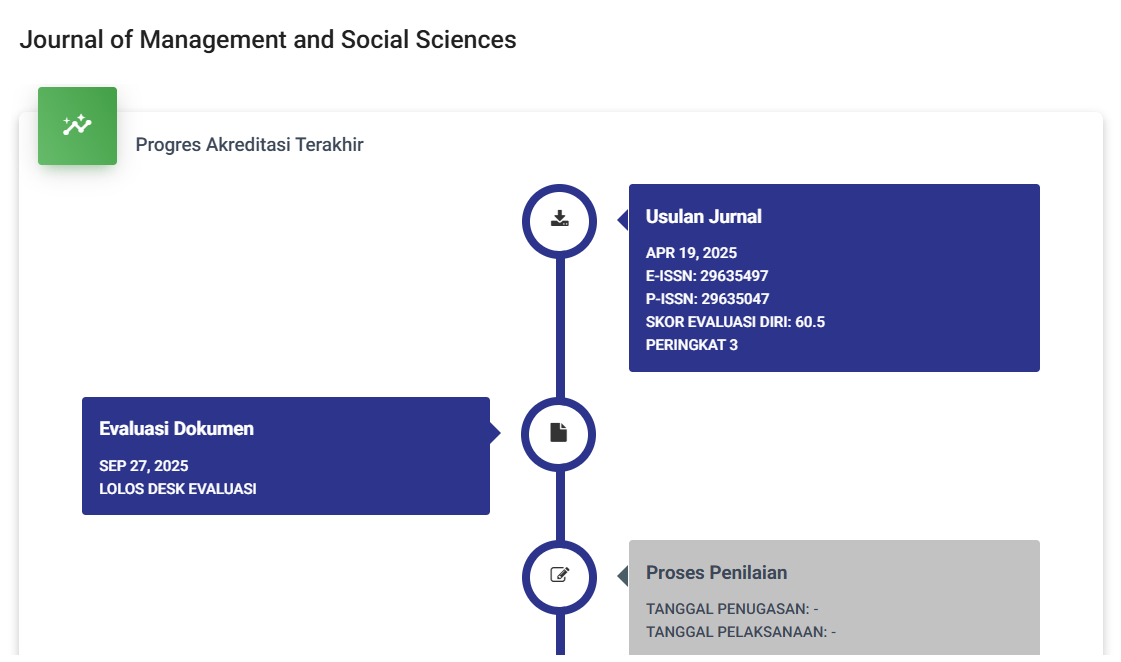Penerapan Digital Accounting pada Era Digitalisasi untuk Meningkatkan Performa UMKM di Kelurahan Nginden Jangkungan Surabaya
DOI:
https://doi.org/10.55606/jimas.v2i3.373Keywords:
SMEs, digital accounting systems, business developmentAbstract
Research using this qualitative method has the aim of knowing the application of digitization of accounting in MSME bookkeeping in the Nginden Jangkungan Village, Surabaya, and increasing understanding of the importance of digitalization in MSMEs. The population used in this study were MSMEs in the Nginden Jangkungan Village, Surabaya, and the samples were taken using a random sampling technique. The results of this study indicate that there are still several MSMEs that have not implemented a digital accounting system due to the lack of information they obtain to implement the system. However, several MSMEs have successfully implemented this digital accounting system. The existence of application of digital accounting can improve the performance of MSMEs in the Nginden Jangkungan Village area, Surabaya. The use of this digital accounting system can simplify the process of recording and reporting finances, avoiding the risk of data loss.
References
Arikunto, S. (2010). Produser penelitian suatu pendekatan praktek. Jakarta: Rineka Cipta.
Dewi, M. K. (2018). Skala Usaha dan Umur Usaha yang Mempengaruhi Penggunaan Sistem Informasi Akuntansi (Studi Empris Pada Toko Kue dan Roti di Kota Padang). Jurnal Pundi, 2(3), 241–252. https://doi.org/10.31575/jp.v2i3.89
Flynn, A., & Davis, P. (2017). Investigating the effect of tendering capabilities on SME activity and performance in public contract competitions. International Small Business Journal: Researching Entrepreneurship, 35(4), 449–469. https://doi.org/10.1177/0266242616630035
Hamid, A. A., Razak, F. Z. A., Bakar, A. A., & Abdullah, W. S. W. (2016). The Effects of Perceived Usefulness and Perceived Ease of Use on Continuance Intention to Use E-Government. Procedia Economics and Finance, 35(October 2015), 644–649. https://doi.org/10.1016/s2212-5671(16)00079-4
Hernawan, Y., & Wijaya Kesuma Dewi, S. (2018). Workshop Manual & Digital Accounting Pada Badan Usaha Milik Desa Girimekar. Jurnal Pengabdian Kepada Masyarakat, 1(2), 322–333. http://ejournal.bsi.ac.id/ejurnal/index.php/abdimas
Jawapos. (2022). 8 Manfaat Menggunakan Aplikasi Pembukuan Keuangan untuk Proses Bisnis.https://radarjember.jawapos.com/sinergi/21/06/2022/8-manfaat-menggunakan-aplikasi-pembukuan-keuangan-untuk-proses-bisnis/. Diakses tanggal 20 April 2023.
Kieso D.. Weygandt J.. Warfield T. (2019). Intermediate Accounting. Seventeenth Edition. Wiley. Inc. USA
Lilis Puspitawati, S. D. (2011). Sitem Informasi Akuntansi. Yogyakarta: Graha Ilmu.
Medcom.id. (2022). 4 Tahap Data Kualitatif dalam Penelitian Sosial. https://www.medcom.id/pendidikan/tips-pendidikan/PNg7190N-4-tahap-analisis-data-kualitatif-dalam-penelitian-sosial. diakses tanggal 20 April 2023.
Miftah, M., & Febri Sukmawati. (2020). Digitalisasi Akuntansi Pengelolaan Keuangan Dengan Metode Accrual Basis Pada Klinik As Shifa Kendal. Kompak :Jurnal Ilmiah Komputerisasi Akuntansi, 13(1), 47–62. https://doi.org/10.51903/kompak.v13i1.156
Pangestu, I. (2022). Digital Adalah: Pengertian, Sejarah, dan Manfaatnya. https://idmetafora.com/news/read/1132/Digital-Adalah-Pengertian-Sejarah-dan-Manfaatnya.html. Diakses tanggal 20 April 2023.
Sugiyono. (2014). Metode Penelitian Kuantitatif, Kualitatif dan R & D. Bandung: Alfabeta.
Sugiyono. (2018). Metode Penelitian Kombinasi (Mixed Methods). Bandung: Alfabeta.
Wijaya, R. S., Rahmaita, Murniati, Nini, & Mariyanti, E. (2023). Digitalisasi Akuntansi Bagi Pelaku UMKM Di Lubuk Minturun. Jurnal Pengabdian Masyarakat Dharma Andalas, 02(01), 40–44.
Downloads
Published
Issue
Section
License
Copyright (c) 2023 Devira Larasati, Ari Rohmana, Reza Mutiara, Maria Yovita R. Pandin

This work is licensed under a Creative Commons Attribution-ShareAlike 4.0 International License.








